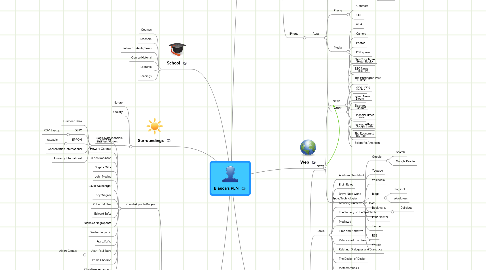
1. School
1.1. Courses
1.2. Teachers
1.3. Fellow Students/Peers
1.4. Course Material
1.5. Lectures
1.6. Readings
2. People
2.1. Knowledgeable People
2.1.1. Daniel Pink
2.1.2. Howard Gardner
2.1.3. Sir Ken Robinson
2.1.4. Sugata Mitra
2.1.5. John Medina
2.1.6. David Weinberger
2.1.7. Tony Wagner
2.1.8. Robert McKee
2.1.9. Edward Tufte
2.1.10. Nicholas Negroponte
2.1.11. Walter Benjamin
2.1.12. Franz Kafka
2.1.13. Jean-Paul Satre
2.1.13.1. Albert Camus
2.1.14. Pema Chodron
2.1.15. Christiane Amanpour
2.2. Media Gurus
2.2.1. Marshall McLuhan
2.2.2. Guy Debord
2.2.3. Thomas de Zengotita
2.2.4. Aldous Huxley
2.2.4.1. George Orwell
2.2.5. Neil Postman
2.2.6. Jane McGonigal
2.2.6.1. Will Wright
2.2.7. Danah Boyd
2.2.8. Mitchel Resnick
2.3. Filmmakers/Artists
2.3.1. Eadweard Muybridge
2.3.2. Thomas Edison
2.3.3. Sergei Eisenstein
2.3.4. Buster Keaton
2.3.4.1. Charlie Chaplin
2.3.4.1.1. Harold Lloyd
2.3.5. Fritz Lang
2.3.6. Alfred Hitchcock
2.3.7. Martin Scorsese
2.3.8. Julian Schnabel
2.3.9. Wassily Kandinsky
2.3.10. László Moholy-Nagy
2.3.11. M.C. Escher
2.4. E-mail Correspondence
2.5. Chats
2.5.1. Skype
2.5.2. iChat
2.6. Phone Calls
2.7. In-Person Discussions
2.7.1. Family
2.7.2. Friends
2.7.3. Peers
3. Surroundings
3.1. Nature
3.2. Society
3.3. Socially Responsible Business Models
3.3.1. Grameen Bank
3.3.2. OLPC
3.3.2.1. XO-1 Laptop
3.3.3. EPROM
3.3.3.1. txteagle
3.3.4. Conservation International
3.3.5. Amnesty International
4. Web
4.1. News
4.1.1. New York Times
4.1.2. BBC News
4.1.3. The Huffington Post
4.1.4. Boing Boing
4.1.5. Wired News
4.1.6. Slashdot
4.1.7. Financial Times
4.1.8. Foreign Affairs
4.1.9. The Economist
4.1.10. Scientific American
4.2. Tools/Technologies
4.2.1. Google
4.2.1.1. Search
4.2.1.2. Google Reader
4.2.2. Youtube
4.2.3. Wikipedia
4.2.4. Blogs
4.2.4.1. Blogspot
4.2.4.2. Wordpress
4.2.5. Bookmarks
4.2.5.1. Delicious
4.2.6. MindMeister
4.2.7. Twitter
4.2.8. RSS
4.2.9. Wordle
5. Media
5.1. News
5.2. Books
5.2.1. A Whole New Mind
5.2.2. Brain Rules
5.2.3. Brave New World
5.2.4. Amusing Ourselves to Death
5.2.5. The Society of the Spectacle
5.2.6. Mediated
5.2.7. Time and Narrative
5.2.8. Valences of the Dialectic
5.2.9. Relating: Dialogues and Dialectics
5.2.10. The Design of Design
5.2.11. Metamorphosis
5.2.12. The Stranger
5.2.13. Sophie's World
5.3. Films
5.3.1. Genre
5.3.1.1. Drama
5.3.1.2. Comedy
5.3.1.3. Indie
5.3.1.4. Foreign
5.3.1.5. Mystery
5.3.1.6. Adventure
5.4. Music
5.4.1. Genres
5.4.1.1. Rock
5.4.1.2. Indie
5.4.1.3. Electronic
5.4.1.4. Classical
5.4.1.5. Industrial
5.5. Art
5.5.1. Exhibits
5.5.2. Paintings
5.5.3. Plays
5.5.4. Media-Related
5.5.5. Performance Art
5.5.6. Sculptures
5.6. Television
5.6.1. News
5.6.2. Films
5.6.3. TV Shows
6. Computer
6.1. Files
6.1.1. Content
6.1.1.1. Data
6.1.1.2. Media
6.1.1.3. Visualizations
6.2. Software/Technologies
6.2.1. Browser
6.2.1.1. Firefox
6.2.1.1.1. Safari
6.2.1.2. Internet
6.2.1.2.1. E-mail
6.2.1.2.2. Chat
6.2.2. Content Creation
6.2.2.1. NeoOffice
6.2.2.2. Keynote
6.2.2.3. Photoshop
6.2.2.3.1. Illustrator
6.2.2.4. Gimp
6.2.2.5. TextEdit
6.2.2.6. TextWrangler
6.2.2.6.1. Dashcode
6.2.2.7. Processing
6.2.2.7.1. Eclipse
6.2.2.8. Quicktime
6.2.2.9. Final Cut Pro
6.2.2.9.1. Soundtrack Pro
6.2.3. Other
6.2.3.1. Preview
6.2.3.2. iTunes
6.2.3.3. Grab
6.2.3.4. Terminal
6.2.3.5. Cyberduck
6.2.3.6. Dictionary
6.3. iPhone
6.3.1. Apps
6.3.1.1. Browser
6.3.1.1.1. Safari
6.3.1.1.2. Internet
6.3.1.1.3. News
6.3.1.2. Phone
6.3.1.2.1. Contacts
6.3.1.2.2. SMS
6.3.1.3. Media
6.3.1.3.1. iPod
6.3.1.3.2. Camera
6.3.1.3.3. Photos
6.3.1.3.4. PS Express
6.3.1.3.5. SketchBookX
6.3.1.3.6. Tesla Toy
6.3.1.4. Other
6.3.1.4.1. 3D Brain
6.3.1.4.2. Planets
6.3.1.4.3. Bloom
6.3.1.4.4. Pandora
6.3.1.4.5. Stanza
6.3.1.4.6. Google Earth
6.3.1.4.7. Tap Tap
